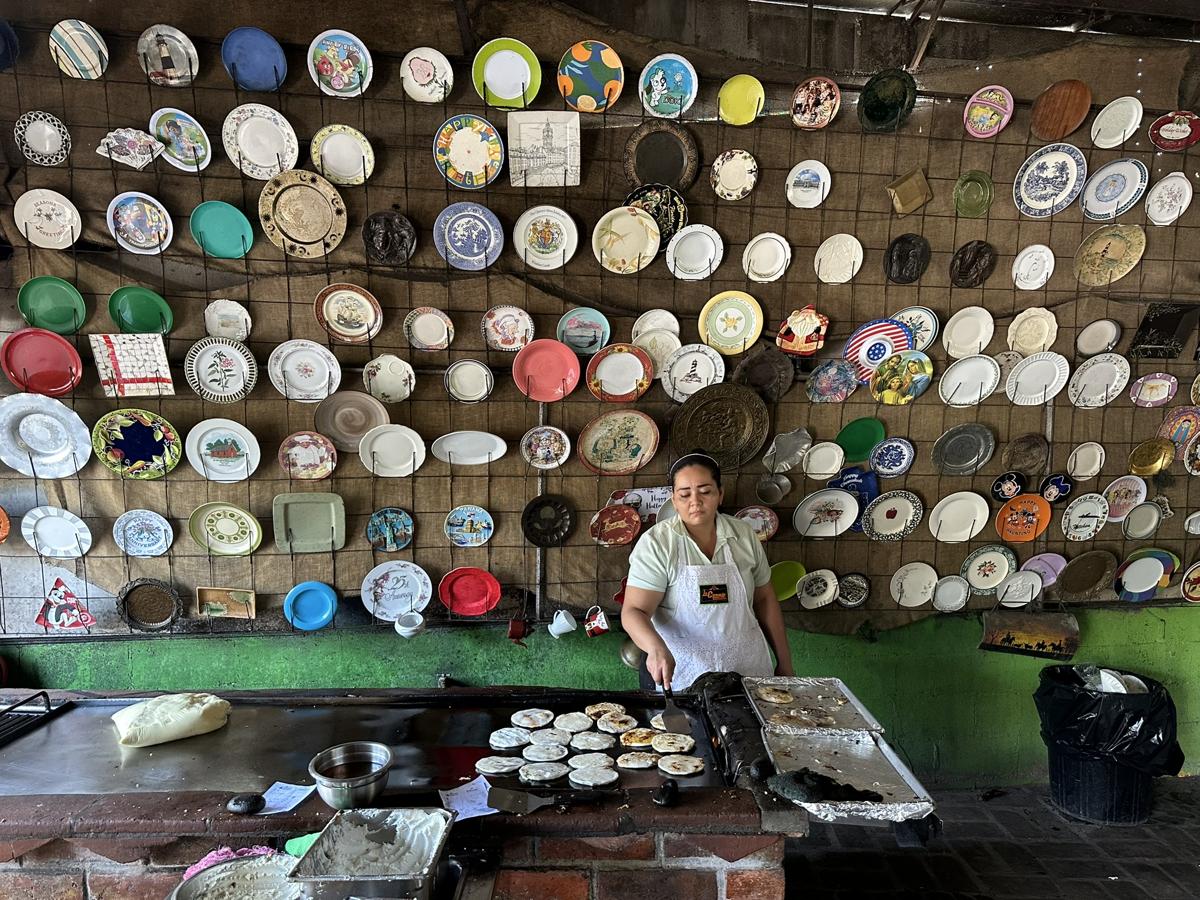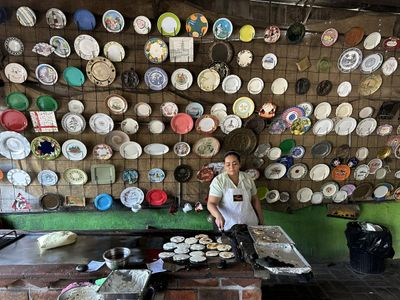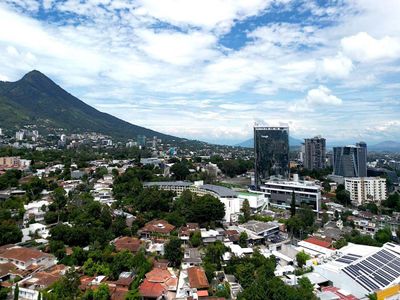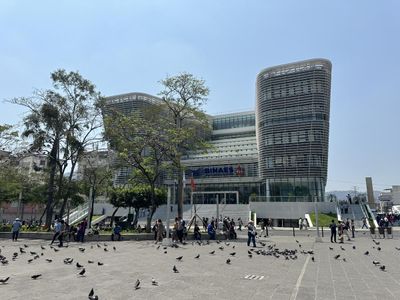
In the vibrant culinary landscape of El Salvador, few dishes evoke as much national pride and affection as the cherished pupusa. A staple of Salvadoran cuisine, the humble yet delectable pupusa is not only a testament to the rich cultural heritage and gastronomical ingenuity of El Salvador but also a comforting symbol of home and tradition. The papusa was officially declared as the national dish of El Salvador in April 2005 by the Legislative Assembly.
A pupusa is a traditional Salvadoran dish made from a thick, hand-formed masa (corn dough) stuffed with various fillings, then grilled to perfection on a comal, a type of flat griddle. Resembling an Arepa or a thick tortilla, pupusas are typically enjoyed with a side of curtido, a tangy slaw made from cabbage, onions, carrots, and spices, along with a dollop of tomato-based salsa.
Papusas are inexpensive and tasty, making them a popular component of the Salvadoran diet. Papuserias are very common in the country, ranging from formal restaurants to informal street vendors. Hundreds of papuserias can be found in the popular neighborhoods in San Salvador.

The history of pupusas dates back centuries, well before the arrival of the Spanish colonizers. Indigenous Pipil tribes in the region were already crafting early versions of this dish, made from the now-forgotten local ingredients. Historical accounts suggest that pupusas were originally made with a blend of squash, wild greens, and mushrooms.
Over the years, the dish evolved, incorporating Spanish-introduced ingredients like pork products and cheese. The name "pupusa" is believed to derive from the Pipil-Nahua word "pupusawa," meaning to puff up. As the dish spread across the nation and beyond, it became a culinary icon, representing the heart and soul of Salvadoran cuisine.
National Pupusa Day in El Salvador is a vibrant celebration held annually on the second Sunday of November, dedicated to honoring the country’s beloved traditional dish, the pupusa. In September 2024, Salvadoran chefs in Washington D.C. broke the record for the largest papusa in the world after preparing a 20-foot papusa on Constitution Avenue during Fiesta D.C.
Olocuilta, a charming town nestled in the department of La Paz, El Salvador, has gained national and international recognition as a pupusa hub. Olocuilta, located between San Salvador and the international airport, is widely celebrated for its culinary prowess in crafting these delectable corn-based papusa treats, drawing visitors from near and far to experience its unique version of this beloved Salvadoran dish. What sets Olocuilta apart is its distinctive use of rice flour instead of the traditional corn masa, giving their pupusas a slightly crispy texture that is both unique and irresistible. The streets are lined with numerous pupuserías, each offering their own variations stuffed with a range of fillings from the classic cheese and beans to more adventurous combinations. Beyond satisfying appetites, Olocuilta's dedication to pupusas is showcased in its annual festivals and community gatherings, where the spirit of Salvadoran culture and hospitality shines brightly, making it a must-visit destination for culinary enthusiasts and cultural explorers alike. Oloculita celebrates National Papusa Day each year, and it previously held the title for World's largest papusa.

While pupusas are a nationwide favorite in El Salvador, regional nuances add variety to this beloved dish. In some regions of El Salvador rice flour is often used instead of corn masa to create a distinct texture that is slightly crispier on the outside. The coastal areas often incorporate seafood variants, blending shrimp or fish with the traditional fillings.
Beyond geographical boundaries, pupusas have also made their mark in Salvadoran expatriate communities, particularly in countries like the United States, adapting to local tastes and ingredients while staying true to their roots. Papuserias are common in Salvadoran neighborhoods.

The beauty of pupusas lies in their versatility. Traditional pupusa fillings include cheese (queso), refried beans (frijoles), and chicharrón (cooked pork meat ground to a paste). However, modern variations offer a plethora of choices to tantalize any palate.
Pupusa de Queso: A straightforward yet delightful version filled with melted cheese, often a blend of soft Salvadoran cheeses or mozzarella for a gooey center.
Pupusa de Chicharrón: This hearty option features tender, braised pork that is pureed and seasoned, providing a savory depth of flavor.
Pupusa de Frijoles: For a vegetarian-friendly variant, refried beans seasoned with spices provide a creamy and comforting bite.
Revuelta: Arguably the most popular choice, "revuelto" combines cheese, chicharrón, and beans into one delectable pupusa.
Loroco: A unique filling made from an edible Central American flower, loroco imparts a distinct floral and tangy taste, often paired with cheese.
Ayote: Incorporating tender, young squash, this variant is a seasonal favorite celebrated for its subtle and sweet notes.
The ingredients list for pupusas continues to expand as creativity in the kitchen flows, making them both a traditional and contemporary delight.
The love affair with pupusas is understandable and multifaceted. Their affordability, ease of preparation, and portability make them an excellent choice for busy days or leisurely Sunday family gatherings. The tactile pleasure of hand-making pupusas, pressing the dough, and stuffing it with delicious fillings, fosters a sense of connection to cultural heritage and family tradition.
Moreover, the satisfaction derived from biting into a warm, cheesy pupusa, complemented by the refreshing tang of curtido and the kick of salsa, creates a harmony of flavors and textures that are both comforting and exciting. This delightful culinary experience is best shared, whether at a bustling market stall, a roadside eatery, or the family dining table.

In El Salvador, pupuserias—establishments specializing in the making and selling of pupusas—are as ubiquitous as they are beloved. Much like doughnut shops or pizzerias, these eateries range from small kiosks in busy marketplaces to sit-down restaurants offering an array of pupusa varieties.
Pupuserias not only provide a reliable comfort food experience but also serve as social hubs, where locals and visitors alike gather to enjoy freshly made pupusas hot off the grill. These establishments reflect the warmth and hospitality of Salvadoran culture, making every meal a communal and joyous occasion.
One of the many reasons pupusas are a staple in El Salvador is their affordability. A single pupusa typically costs between $0.30 to $1.50, depending on the filling and location. This economic accessibility ensures that everyone, irrespective of socioeconomic status, can enjoy a delicious and filling meal. Pupusas thus stand as a quintessential example of how culinary traditions can be both inclusive and nourishing.
Shape the Pupusas:
Cook the Pupusas:
This recipe serves as a base, allowing you to experiment with other fillings such as loroco, chicken, or squash as you prefer. Making pupusas can be a fulfilling and communal activity—great for cooking with friends or family. Enjoy the experience and the delicious outcome!
Pupusas are more than just a meal; they embody the rich history, diverse culture, and enduring spirit of El Salvador. As they continue to gain popularity across the globe, these savory delights offer a taste and experience that are uniquely Salvadoran, inviting first-timers and seasoned aficionados alike to indulge in their simple yet profound charm. Whether you're enjoying them off a street vendor's griddle or at a family gathering in a Salvadoran home, the joy of eating pupusas is universal—a celebration of tradition, flavor, and community.

Sam Martinez
I am a dedicated and passionate real estate professional with more than a decade experience in the real estate market.Explore our latest blog posts







